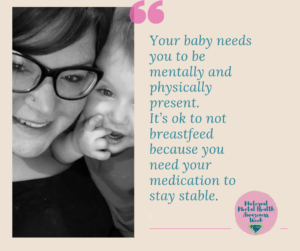This story is for you mommas whose mental health feels like it comes second to breastfeeding, when it should be first.
I have a long history of mental illnesses in my family. I inherited most of them. While they do not define me, they are a part of me. I have Bipolar 1 Disorder, Generalized Anxiety Disorder, Borderline Personality Disorder and a Panic Disorder.
I tried to get pregnant in 2016, but through no fault of my own, was diagnosed with PCOS and had to go back on hormones to re-regulate my cycles. Luckily, I was able to score an appointment with my amazing fertility specialist in Jan 2017 and I soon became pregnant in February. I saw my psychiatrist shortly after and I couldn’t decide if I should bring up how depressed I felt. This pregnancy was very much wanted but I wondered if I risked my stability and my mental health. My husband and I quickly decided pregnancy was not the time to start playing with my medication and I was just going to have to “push” through my depression unless I had thoughts of self-harm.
In this study, researchers found that 1 in 4 women had mental health problems: 15% had anxiety, 11% had depression, 2% had an eating disorder or obsessive-compulsive disorder, and 1% had post-traumatic stress disorder. The research also found low prevalence’s of bipolar disorder and other disorders.
My obstetrician expressed a need for a high-risk obstetrician (Maternal Fetal Medicine, MFM) to get on board with my care. During our anatomy scan, my MFM doctor said the baby looked perfect from what she could see. I was discharged as her patient unless my primary obstetrician felt it was necessary to see her again. I left the office feeling content with our plan. Then it hit me, I forgot to ask about breastfeeding! I emailed her quickly and within hours, I had a response. And it wasn’t a response I wanted.
I was CRUSHED when I saw “your medication secretes in breast milk and I advise against breastfeeding and whatever you do, do NOT stop your medication to do so.”
Talk about a blow. I cried. A lot. I had always wanted to breastfeed for as long as I can remember. I felt so much guilt that she wouldn’t get my milk and that I let her down because of my mental illness.
Rachel, an amazing friend of mine and pediatric nurse practitioner (if you haven’t read her blog, you should because it’s amazing!) and coworker told me about The Fed Is Best Foundation’s private support group and how it helped her feel like she was a wonderful and loving mother even though she had to exclusively formula feed her baby. The more shifts we had together, the more we talked. The more we talked, the more I realized I was letting myself believe in the harmful lactivist rhetoric. Suddenly I realized that I was willing to let myself stop my medication because I wanted to breastfeed. Who thinks that? Certainly not someone normal, right? Well, I did. I had a plan.
I was secretly going to stop ALL my medication and breastfeed because, dang it, I believed breast was best and all good mothers breastfeed their babies.
Boy, did I have it wrong? My husband quickly found out I was not going to take my medication and he was devastated and very concerned. After a heart to heart with him and my therapist, I finally saw the light. My baby girl needed ME more than she needed my breast milk. She needed a stable and mentally healthy mom more. Talking more with my friend Rachel and being in the Fed is Best Support Group, I became more and more at peace about having to formula feed. Soon, I got my Mom’s and my oldest sister’s support, who both breastfeed all their children, and they said they’d help me every step of the way.
Without them and the Fed Is Best support group, I likely would have stopped my medication, gone to a dark place and likely ended up in a hospital with a mental breakdown.
And the bonding? She’s presently crying, banging on the door because she wants to be inside the room with me. We had some formula hiccups along the way but figured them out. She’s now 13 months old and seriously the light of my life. And yes, I had postpartum depression even while medicated. It happens. Get the help and support you deserve momma. You are so much more to your baby than your breast milk.
You are their life. Their person, their mom.
You need your medication to be a better mom? Take it. She or he won’t know the difference. Because you are what they need more.
I hope my story helps any mom feel better about needing her medication to be mentally stable. I just want to say, “Thank you.” Thank you for teaching us that WE mothers are what matter…not the method of how our baby is fed. I had to put ME first so I could be there for her and that includes how I fed her.
We are BOTH thriving and happy as can be because fed really is best.

Jessica Gibson Rubio
is a member of our Mental Health Advocacy Team and her goal is to talk to mothers whose mental health feels like it comes second to breastfeeding, when it should be first.
She writes:
Before I can thoroughly explain my recovery, I have to start with my diagnosis’s. In 2009, I was diagnosed with Bipolar 1, Borderline Personality Disorder, Generalized Anxiety with Panic Disorder. Phew…so many! When I began my fertility journey, I quickly realized that I needed my medication during my pregnancy. My bipolar medicine doesn’t have much information in pregnant women, but the benefit outweighs the risk to my baby. All my other medications were considered safe. I chose to stay medicated because I truly needed it. But even though I had my medication, I still had perinatal depression. The deeper the depression got, the more my life was sucked out of me. I slept 18-20 hours a day and had only the strength to go to work. My marriage struggled, hard. My psychiatrist and I decided now was not the time to be playing with medications and I would just have to “push” through unless I had thoughts of self-harm. All I could think was that I was terrified of being hospitalized, again, this time being pregnant.
I found The Fed Is Best support group, and sought comfort in knowing that my option to formula was in fact, OK. Knowing that I could share night feeds, have other people help, was huge in my recovery. My biggest manic trigger is sleep deprivation. This was good news! While I delivered in BFHI hospital, my RN’s were nothing but supportive of me needing to formula feed, as was my OB/GYN. I thought I was doing ok postpartum. And boy was I so wrong. At my daughters 6 month well visit, I failed the Depression scale. Being as that my daughters’ pediatrician was also a friend of mine who knew my extensive history of mental illness, told me I had postpartum depression and that I needed to see my psychiatrist. My road to recovery is still ongoing and my daughter is 18.5 months. I finally am feeling human again. I feel happy, stable. Sure, I have some hiccups every now and then, but I do my best. I hope my story can help other moms who have bipolar know that they are just as important and that their mental health comes first and foremost. And that your baby or babies, need YOU more than your breast milk and to remind them that it’s ok to not breastfeed because you need your medication to stay mentally healthy.
Additional blogs about mental health:
Clinicians’ Guide to Supporting Parents with Guilt About Breastfeeding Challenges
Maternal Mental Health Feels Like it Comes Second to Breastfeeding When It Should Be First
WAYS YOU CAN SUPPORT FED IS BEST
There are many ways you can support the mission of the Fed is Best Foundation. Please consider contributing in the following ways:
- Join the Fed is Best Volunteer group to help us reach Obstetric Health Providers to advocate for counseling of new mothers on the importance of safe infant feeding.
- Make a donation to the Fed is Best Foundation. We are using funds from donations to cover the cost of our website, our social media ads, our printing and mailing costs to reach health providers and hospitals. We do not accept donations from breast- or formula-feeding companies and 100% of your donations go toward these operational costs. All the work of the Foundation is achieved via the pro bono and volunteer work of its supporters.
- Share the stories and the message of the Fed is Best Foundation through word-of-mouth, by posting on your social media page and by sending our resources to expectant moms that you know. Share the Fed is Best campaign letter with everyone you know.
- Write a letter to your health providers and hospitals about the Fed is Best Foundation. Write them about feeding complications your child may have experienced.
- Print out our letter to obstetric providers and mail them to your local obstetricians, midwives, family practitioners who provide obstetric care and hospitals.
- Write your local elected officials about what is happening to newborn babies in hospitals and ask for legal protection of newborn babies from underfeeding and of mother’s rights to honest informed consent on the risks of insufficient feeding of breastfed babies.
- Send us your stories. Share with us your successes, your struggles and every thing in between. Every story saves another child from experiencing the same and teaches another mom how to safely feed her baby. Every voice contributes to change.
- Send us messages of support. We work every single day to make infant feeding safe and supportive of every mother and child. Your messages of support keep us all going.
- Shop and Fed is Best Foundation will earn cash back! We hope to develop our online safe infant feeding classes with these funds.
- If you need support, we have a private support group– Join

5 thoughts on “Maternal Mental Health Feels Like it Comes Second to Breastfeeding When It Should Be First”